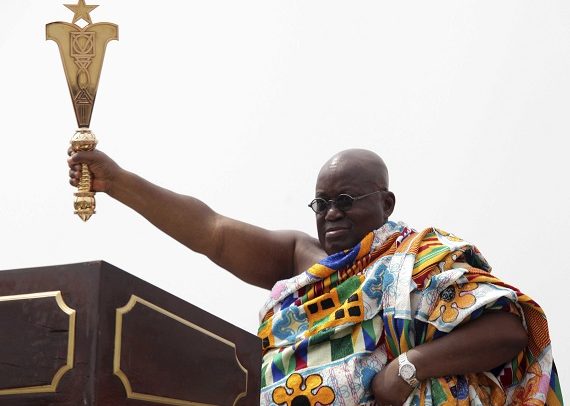Apparently to be elected as a President of a country is a life time privilege which comes with juicy trappings and enormous responsibilities.
Thus, ideally, someone with vast life experience, a catalogue of suitable employable skills, a portfolio of relevant qualifications, tried and tested competency and requisite knowledge should be a suitable candidate for the position.
That being said, the emergence of democracy has energised every sound adult Ghanaian to compete for such an important position.
Regrettably, however, we have, more often than not, been electing ‘a semicircle’ of negligent officials whose only preoccupation is to sink the nation deeper and deeper into the mire through incompetence and unbridled corruption.
It is, indeed, an undeniable fact that we choose to exercise our voting rights by electing a President in anticipation that the said leader will form a formidable government to run the affairs of the country to the benefit of all and sundry.
Nevertheless, it would be absolutely wrong for anyone to suggest for a moment that every leader could prudently steer the nation to the right direction if given the opportunity.
Apparently, contending schools of thought have been maintaining that NDC would have stood a better chance in 2020 if the party delegates had elected a different flagbearer instead of former President Mahama.
The sceptics argued that ex-President Mahama abysmally mismanaged Ghana’s economy by moving the economic growth of 14% in 2011 to 3.4% and single digit inflation to 15.4% by December 2016.
Observers however insisted that a chunk of Ghana’s scarce resources was wasted on dubious judgement debt payments purported to be around GH¢800 million, including the GH¢51.2 million to Woyome, $30 million to the Waterville and $325,000 to Isofoton, which resulted in the drastic reduction of capital expenditure, and as a consequence, most contractors were not paid by the erstwhile NDC administration.
Interestingly, other critics believed that Mahama’s government could not mobilize our revenues efficiently as the likes of former President Mahama’s brother, Ibrahim Mahama, was caught evading import taxes to the tune of GH¢12 million.
It is also true that many discerning Ghanaians were not enthused when Mahama’s government wilfully misapplied $175 million loan facility secured in 2012 which was to provide seven district hospitals.
Truth be told, the good people of Ghana were shocked to the bone when over GH¢200 million SADA funds invested on trees burnt down and guinea fowls mysteriously flew to the nearby Burkina Faso without a trace.
Frankly stating, but for President Akufo-Addo’s timely intervention, Mahama’s administration would have shockingly given away over 58% of Ghana’s bauxite to family and friends just about a week before exiting power.
Discerning Ghanaians, so to speak, became fed-up with the extremely harsh conditions amid corruption allegations (Bus branding, Brazil World Cup, SADA, SUBA, GYEEDA, SSNIT, MASLOC, NCA, Ford Expedition Vehicle, amongst others).
Unsurprisingly, therefore, on December 7, 2016, discerning Ghanaians found in NPP, a trusted redeemer, in whom they reposed their absolute trust to set them free from the Mahama government’s unpardonable economic enslavement.
Mind you, the thoughtful critics could not be far from right for suggesting that if discerning Ghanaians had not graciously intervened by showing the dreadful economic managers (NDC) the exit through universal adult suffrage, the terrible errors in decision-making and the rampant corruption would have wiped out Ghana off the world map without a trace.
Given the circumstances, we could confidently deduce that discerning Ghanaians made the right choice on December 7, 2016 by electing the septuagenarian Nana Akufo-Addo and retiring the sexagenarian John Dramani Mahama.
In fact, it is somewhat spurious for sceptics to argue that all politicians are the same when in power and therefore there is no need to change from one to another.
The truth, however, is that the sceptics feeling of indignation with the current political dynamics is something shared by many Ghanaian electorates. But then again, the critics’ disposition appears somewhat impetuous, because politicians have different levels of temperament, competence, experience, knowledge, skills and abilities, so they are never the same, as a matter of fact.
In any case, there is enough evidence to counter the sceptics who insist that politicians are the same when in power.
Take, for instance, President Kufuor, who worked studiously to move Ghana from the Highly Indebted Poor Country (HIPC) status to a Lower Middle Income status when he took over from former President Rawlings in 2001, could not be referred to as a laid-back leader.
- Badu, UK.
k.badu2011@gmail.com


